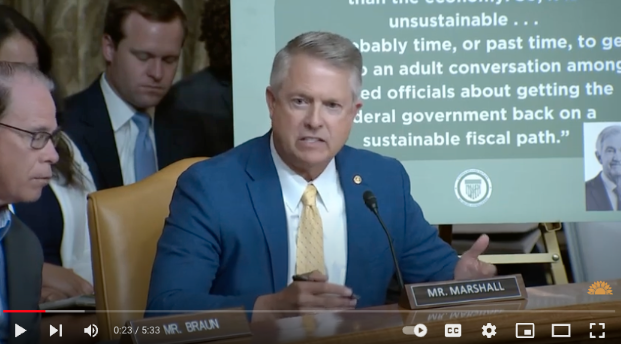Senator Marshall Leads Calls for Fiscal Responsibility at Budget Hearing with CBO Director
Washington, D.C. – U.S. Senator Roger Marshall, M.D. called on the federal government to cut back spending by reforming Congress’ budget process and enforcing fiscal responsibility at today’s Budget Committee Hearing with Congressional Budget Office (CBO) Director Dr. Philip Swagle.
At the hearing, Senator Marshall sounded the alarm on the historic national debt crisis caused by recent far Left spending initiatives by congressional democrats and executive actions taken by the Biden Administration. Senator Marshall discussed with Dr. Swagle the budgetary impacts of preventing Supplemental Nutrition Assistance Program (SNAP) fraud, error, and abuse in the upcoming Farm Bill.

You may click HERE or on the image above to watch Senator Marshall’s full questioning.
Highlights from Senator Marshall’s Remarks Include:
On the CBO’s Inaccuracy in Scoring Budgetary Impacts of Legislation:
Senator Marshall: Dr. Swagle, let me ask you, do you ever review your work in the past? Do you go back and look at the last 10 years and say, what percentage were we off on our scores?
Dr. Phillip Swagle, CBO Director: We do, we go back for major legislation and analyze what we got right, and what we got wrong.
Senator Marshall: For the last 10 years, what has your score sheet looked like, speaking in general?
Dr. Swagle: So we compare ourselves to other major forecasters, and we do pretty well, there’s some things that we do well.
Senator Marshall: No, you don’t do well. You just missed the deficit this year by half a trillion dollars – that’s not doing well. Don’t you think you’re off 10, 20, 30, 40% on most of the big numbers?
Dr. Swagel: Right. So from February to June, the deficit went up by 27%, mainly because of actions taken by the administration. And so the student loans, the FDIC, actions on Medicaid. We’re providing you with the current law.
Senator Marshall: Through executive fiat, they added – goodness, three or four? Oh, goodness, I guess it’s about a trillion dollars.
Dr. Swagle: That’s right, between student loans and the other pieces, there’s, you know, several hundred billion dollars in additional costs.
On Congress Following a Meaningful Budget:
Senator Marshall: If we did a meaningful bipartisan Senate budget resolution, and we went back to regular order, and the House did their job. If we did a real budget, would that have impact on how much money we spend? Is that something you could help generate a CBO score for?
Dr. Swagle: I mean, we would certainly support the Congress in doing that. It’s hard to say what the outcome would be. Regular order would certainly be a change, but I can’t tell you what the fiscal outcome would be.
Senator Marshall: Certainly it works in the private sector, to do a meaningful budget and then use that as the blueprint and not allow an administration to tack on, like you just mentioned, almost a trillion dollars of unsuspected spending through executive fiat, which is unconstitutional the way they did it. As we mentioned before, the 2024 budget deficit is going to be $2 trillion. We’re going to spend $2 trillion more than we take in this year. The administration added $2.1 trillion with the American Rescue Plan, another $800 billion with the Inflation Stimulation Act. People call it the Inflation Reduction Act but it’s actually inflationary, as well as over another trillion unilaterally, as you mentioned, through executive actions. The student loans, $400 billion. They redefined the Thrifty Plan, another $300 billion, and then they did some voodoo with the ACA and another $300 billion as well.
On fixing errors in SNAP to reduce the deficit:
Senator Marshall: I want to talk about SNAP for a second. We’re in the middle of trying to write a Farm Bill, and I’m concerned about the politics at play in scoring a piece of legislation that’s extremely important to everybody. You know, 85% of the Farm Bill is SNAP payments, nutritional programs. The largest part of the Farm Bill also has the highest fraud rate and error rate. There has been an over annual repayment rate of 10%. Stopping the error rates, stopping the fraud, stopping the overpayments result in nearly $100 billion in savings to the SNAP program over the next 10 years. So if we get rid of the fraud and abuse and errors, it will save $100 billion over 10 years. Do you believe that fixing the error rate in SNAP would be a cut to the program?
Dr. Swagle: It would make sure that the beneficiaries who are supposed to get the benefits are getting them and you know, not other people.
Senator Marshall: The bipartisan Farm Bill that’s passed out of the House Ag Committee has a provision in the nutrition title which preserves SNAP benefits, and ensures that benefits can modestly increase with the cost of living. Now, my friends across the aisle in the Senate are calling these provisions the largest cut to SNAP in history. In your opinion, do you consider this a cut?
Dr. Swagle: So, you know after we saw what the administration did with the changes to the Thrifty Food Plan, we then had to assume that in the future, there could be such large increases again. I said before, that was about $200 to $250 billion of additional costs, and so that gets built into the baseline. What the House has done is scale that back, and so there’s a sense in which they’re preventing a future administration from doing the kind of increase that was done.
Senator Marshall: But net-net at the end of the day, we’re going to be spending more money on SNAP in the future than we are today.
Dr. Swagle: That’s correct.
